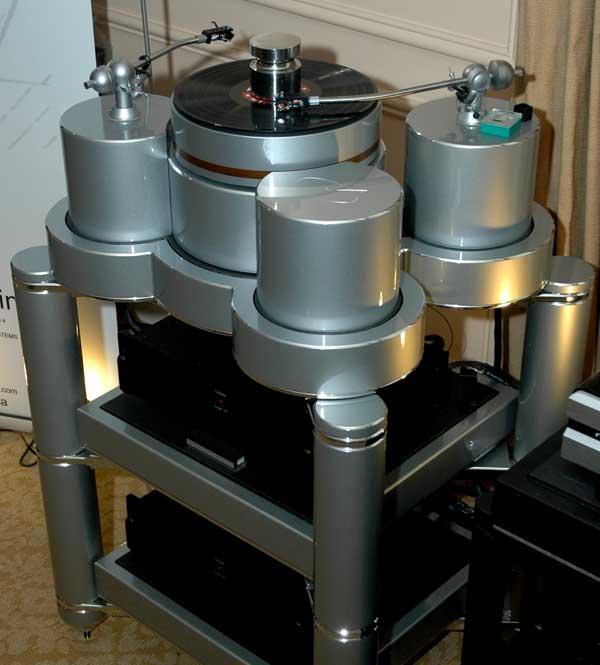|
fiogf49gjkf0d
Anyone who has more than a superficial experience with better turntables knows that speed stability is not the subject that civilized people shall even mention. Any turntables shall stabilize speed of disc rotation at the point that it is not auditable to a listener. All turntables, even that cost $50 do it, which is a norm. However, with expensive high-end turntable it is a bit freaky.
If you buy a $50 turntable then it will do a fine speed stability way beyond where you need to worry about it. The stability of the rotation will not be even specified but you never see those turntables have any problems with speed correctness or with its variation. Then we have expensive high-end audio tables that cost tens thousand dollars. For whatever reason the high-end turntable declare a way on the disc stability and attack the problem with all imaginary angles. The documentation publishes disk stability on .001% and the idiots-reviewers are gloating how stable the rotation is. Still, besides all BS that about the importance of speed stability there is one undeniable fact: I never experience problems with speed stability accepts from high-end turntables. A crappie $25 TT from a local pound-shop has speed stability that it never bother me but many of $25.000 high-end mastodons do not play records with proper or stable speed. I have no idea why it happens.
Some of you might read in my Michael Fremer thread:
http://www.goodsoundclub.com/Forums/ShowPost.aspx?PostID=1957
… the story how Continuums demonstrated itself and no one in the room, including all Continuums designers were not able to understand that that a turntable runs at wrong speed. It took for me a few notes and I objected the sound and the TT speed, the Continuums people did not acknowledge it until they measured it. I am not against Continuums people – they are just Hi-Fi audio engineers – what they might know about Sound? However, I do objects that if a TT cost over $100K then it might be even a remote possibility that speed instability might exist. If $25 TT never have this problem than the fuck we do paying $100K for a TT of the TT enable to maintain such a simple characteristic as stable speed?
The reason I writing it is because I read this morning Myles Astor’s comment about 2010 SES where he is taking about Redpoint Solo Voce turntable with a price tag of $96,000.

http://positive-feedback.com/Issue47/cesma.htm
Myles Astor writes: “turntable Solo Voce was having trouble maintaining proper speed on day 2”. My question is: who would it possible that this $100K turntable had trouble to get stable cruse speed? Warn you that it is not in a home of an ignorant audiophile who have no idea what the hell he is doing but in a best possible situation when the TT is surrounded by the designer and the people who truly know how a given TT operates. Sure the malfunctions are possible – no one argue it but why the malfunctions NEVER happen with $25 Sony or Toshiba TT but they ALWAYS happened with super expensive TT? Is it an evidence that those super expensive TT are juts inferiorly built? I do not know, you deside, my job is to point the pattern, your job to make conclusions… The Cat
"I wish I could score everything for horns." - Richard Wagner. "Our writing equipment takes part in the forming of our thoughts." - Friedrich Nietzsche
|